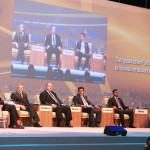“To have a nuclear program, a country needs social and political support.”
“We have taken additional measures since Fukushima. Our latest designs allow operation without power [from an outside source to cool the reactor] and to run without operators for days,” said Dan Roderick, president and CEO of Westinghouse. He described it as a measure “against an event outside the design basis.”
Roderick also said that Westinghouse has introduced a new “modular construction method.” Previously, it took 10 years to build a reactor, but the construction period has now been reduced to five years. “With the new modular method we can go from pouring concrete to generating electricity in less than 39 months,” he said.
“Our new designs do not allow radiation to escape into the atmosphere even at the levels at Fukushima,” he noted.
“If you want energy security you can’t do it better than nuclear; you are not dependant on any commodity. Renewables are great but you cannot use thermal for backstopping. If you do that, you will have a larger carbon footprint than when you had nuclear. That is what happened in Germany. They increased their renewable but then turned off nuclear power and increased reliance on some very polluting thermal to make up the difference,” Roderick added.
Samir Bikho, CEO, AMEC UK: “Nuclear will continue to be in the equation. Nuclear is the most affordable in the long term equation.”
Mohammed Al Hammadi, CEO, ENEC UAE, said that his country had ordered four nuclear reactors from Korea because it was cost effective. “We make more money selling oil than using it at home to generate electricity. Moreover we avoid sending 12 million tons of CO2 gas into the atmosphere every year,” he explained
“We intend to rely 25 percent on nuclear generated electricity” because “it is reliable, sustainable, secure and environmentally friendly.” He added that “flying from Abu Dhabi to New York, you are exposed to more radiation than if you are working in a nuclear reactor.”
This news story is based on the session Bottom Line, "Two years after Fukushima: Is the nuclear renaissance over?", at the 2013 World Energy Congress.






